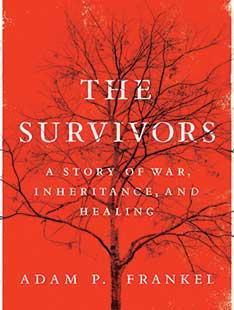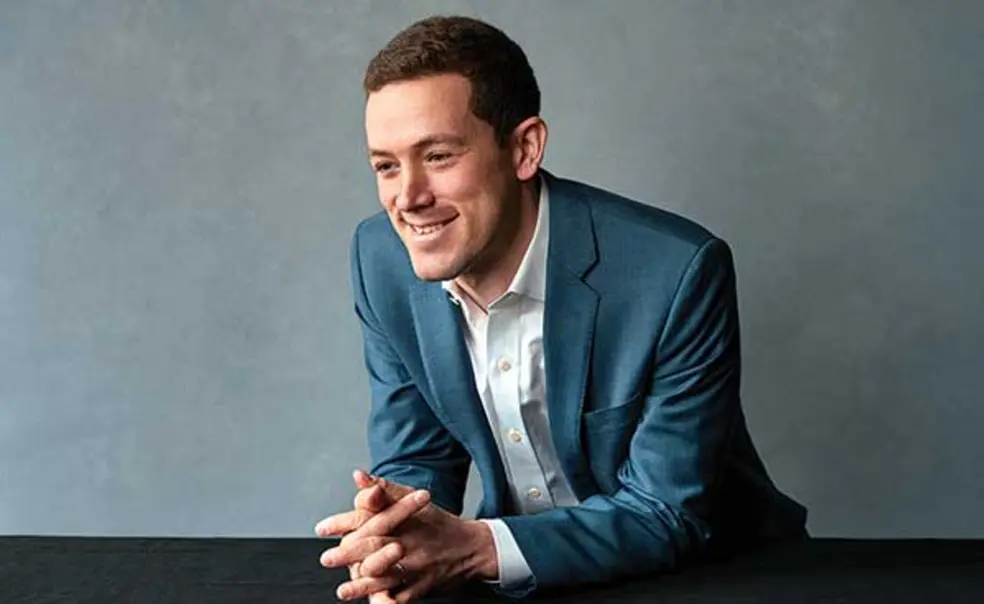Holocaust Trauma and its Effects, Generations Later
Adam P. Frankel ’03’s new book is dedicated to his children.
That often-customary gesture has unusual resonance in Frankel’s memoir — The Survivors: A Story of War, Inheritance, and Healing (HarperCollins) — because the book centers on the complex and sometimes painful legacies that parents pass on to their children.
Frankel, a one-time speechwriter in the Obama White House, is the grandchild of Jewish Holocaust survivors from Lithuania whose suffering, he believes, profoundly shaped the life of his brilliant, emotionally unstable mother. The climate of secrecy and buried pain in which she grew up distorted her adult relationships, eventually culminating in a shattering revelation that reshaped Frankel’s sense of his own identity.
The book is both a Holocaust story and a broader look at family dynamics. “It’s a personal memoir of how trauma can reverberate from one generation to the next, whatever the trauma may be,” Frankel says. “Every family experiences it differently.”
When he left the Obama administration in late 2011, Frankel —now an adviser to a communications firm and a social-change organization — planned to write a very different book, an account of the lives of all four of his grandparents, contrasting exemplars of Jewish survival.

His maternal grandparents, the Perecmans, lost siblings and parents during the Holocaust before emigrating to New Haven, Conn., where grandfather Gershon owned a jewelry and watch-repair shop. Gershon survived a subcamp of Dachau, the notorious concentration camp outside Munich. As a teenager, grandmother Rivke joined a brigade of Jewish resistance fighters living in a forest in Eastern Europe.
The family of Frankel’s father, Stephen Frankel ’69, experienced the war years from the American side. Grandfather Stanley served in the South Pacific and eventually became a corporate executive and sometime-speechwriter for Democratic politicians. Grandmother Irene’s younger sister married Newton Minow, who chaired the Federal Communications Commission during the Kennedy administration.
Frankel drafted a manuscript about his grandparents’ lives, but a change of editors shifted his focus, steering him toward a more personal — and, ultimately, more therapeutic — grappling with the ways Holocaust trauma contributed to his mother’s mental illness and damaged his own childhood.
His mother and her three siblings were named for relatives murdered just a few years earlier; even in old age, Frankel’s maternal grandmother suffered from nightmares, sometimes crying out the names of her dead sisters in her sleep. “Ghosts lived in that house with them,” Frankel says.
The Perecman family’s deepest shared secret concerned their name: In a displaced-persons camp in Germany after the war, the parents had discarded their true identities and assumed false ones, worried that Gershon’s connection to a contraband-smuggling operation in the camp would jeopardize their emigration to the United States.
Although the deception seems minor today, the family guarded their secret ferociously, apparently fearing it could endanger their eligibility for the postwar reparations Germany paid to Holocaust survivors. The frequent lies — for instance, to explain why Gershon’s father, who had survived the war, had a different last name than his son did — accustomed the family to silence and concealment.
Writing the book, Frankel says, gave him a way to break free from the tyranny of secret-keeping, which had warped his relationships with his mother and his extended family. Although some relatives, including his parents, have voiced reservations about publishing such deeply personal material, “I needed to write the book, period, for my sake,” he says. “No secrets. This is how we clear the air and move on with our lives.”
And with the passing of the generation that survived the Holocaust and fought World War II, recounting these stories of sacrifice, survival, and resilience is more important than ever, Frankel argues.
“For reasons that are even clearer now than they could possibly have been when I started writing this book, it is important to be mindful of that history — not just of the nationalism and racial-purity ideas that contributed to the Holocaust, but just the dangers, more broadly, of fascism, the imperative of being vigilant about democracy,” he says. “If we fail to think about that and be mindful of that, then we’re doing that at our peril.”












No responses yet